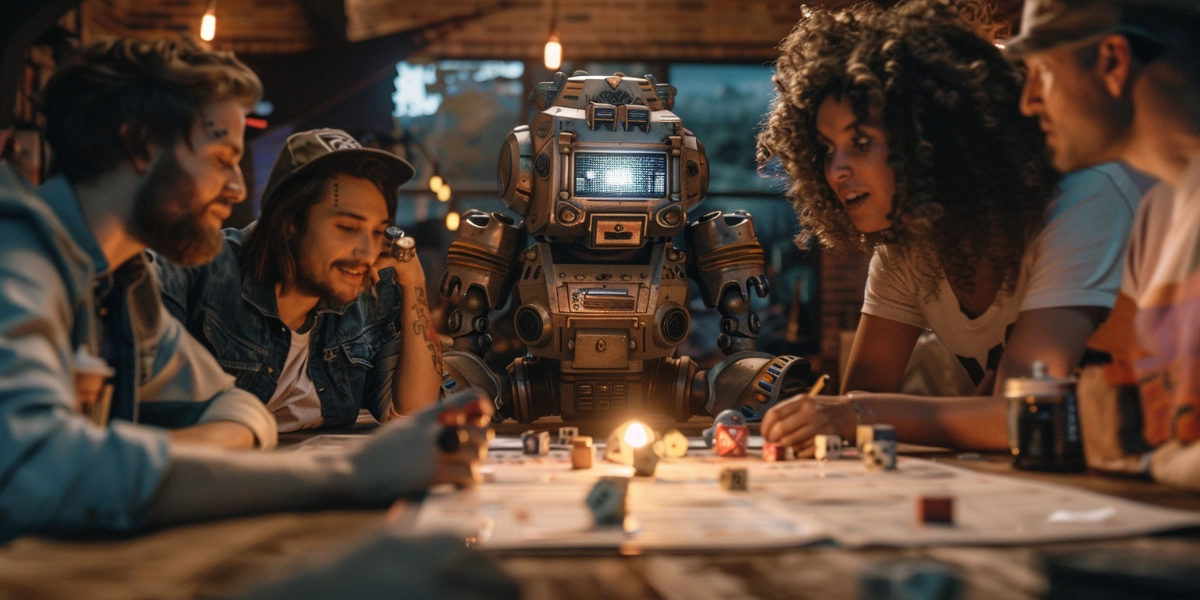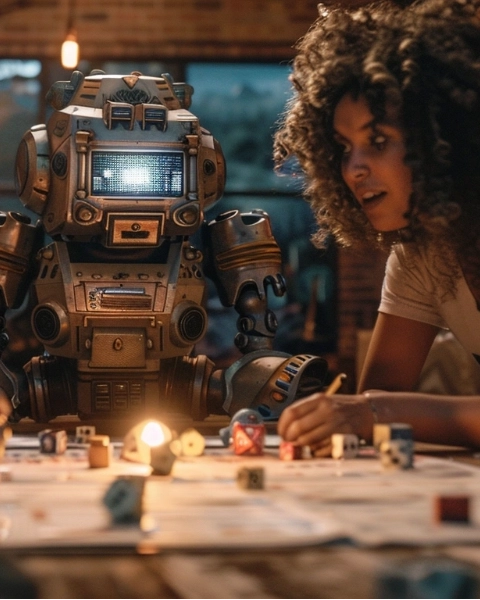
Embracing AI in TTRPGs - Enhancing, Not Replacing, Creativity
AI can streamline search, lore, prep, and tracking in tabletop play, freeing DMs and players to focus on storytelling while keeping human creativity central.
The TTRPG community has been abuzz with discussions about AI, and understandably so. The mere mention of artificial intelligence in our beloved hobby often sparks heated debates and anxiety. There's a palpable fear that AI might replace the human creativity that forms the very essence of tabletop roleplaying games. In these discussions, we've sometimes been too quick to judge, too harsh in our criticisms, and perhaps a bit too reactionary. Without doubt, there's Fear, Uncertainty, and Doubt (FUD) surrounding AI, but there are also great possibilities when used thoughtfully. As with many topics in our community, we need to approach the AI conversation with more open-mindedness and less cruelty towards those with differing views. After all, the spirit of TTRPGs is one of collaboration and imagination – qualities we should bring to these important discussions as well.
Recently, Hasbro's CEO mentioned exploring ways to incorporate AI into D&D, which predictably caused a significant backlash. Many assumed this meant replacing creative teams with AI-generated content. However, it's worth noting that this wasn't explicitly stated, and there are numerous potential applications of AI that could enhance, rather than replace, the TTRPG experience.
While I share the community's concerns about AI-generated books, adventures, or artwork, I believe we're overlooking some genuinely beneficial uses of AI that could improve our gaming experiences. Let's explore some of these possibilities:

1. A DnDBeyond Search that Actually Works!#
Imagine a D&D Beyond with a truly functional search feature powered by AI. A Perplexity-like AI could revolutionize how we access and utilize the vast amount of information in the digital toolset. This would save DMs and players countless hours of frustration trying to locate specific rules, spells, or creature stats. Extend this to your library of PDFs, GM Notes, and Campaign Logs and now you've got a truly useful personal assistant. "Show me examples of area effect zones in grid based combat from the DMG."
2. Lore Summarization#
One of the most exciting potential applications of AI in TTRPGs is summarizing published content. An AI chatbot that could provide concise summaries of lore from various settings like the Forgotten Realms, Dark Sun, or Eberron would be invaluable. This tool could help DMs quickly refresh their memory or give players a brief overview of a setting without spoiling key plot points. "Summarize the history of the city of Waterdeep from the Dungeon Master's Guide.", "Give me a list of the named wizards from the city of Thay."
3. Advanced Random Tables#
We already use random tables for various aspects of our games. AI could take this concept further, generating more complex and contextually appropriate random elements on the fly. This could include NPC personalities, location details, or even plot hooks that align with the current game state. Better yet, if you have access to your campaign notes you can do things like ask it to related a random encounter to a specific NPC or location. "Generate a random encounter along the Triboar trail that involves bandits and smugglers and add a complication to the encounter based on the notes for the mountain gnome enclave."
4. Game Management Assistant#
AI could be a game-changer for the administrative side of running a TTRPG campaign. Imagine an AI assistant that helps with:
- Scheduling games and managing player availability
- Keeping track of session logs and important plot points
- Organizing campaign notes and player character information
5. VTT Scene Preparation and Management#
Virtual Tabletop (VTT) platforms have opened up new possibilities for online play, but they've also increased the workload for DMs. An AI assistant could help streamline VTT preparation and management by:
- Suggesting appropriate maps and tokens based on the planned encounter
- Automating lighting and fog of war settings
- Handling initiative tracking and turn management
This kind of AI integration could significantly reduce the time DMs spend wrestling with VTT logistics, allowing them to focus more on storytelling and player engagement.
6. Managing Characters and Game Content#
At their core, TTRPGs are essentially analog databases. We constantly reference character abilities, skills, equipment, and various other game elements. This often involves tedious record-keeping and calculations that, while necessary, aren't particularly enjoyable. AI opens up exciting new possibilities to streamline these processes and make our game data more accessible and useful.
Character Sheet Management
Imagine an AI assistant that can instantly provide you with any information from your character sheet, summarize it, transform it into a different format. Need to know your current load and carrying capacity? Just ask. Want a quick summary of all flammable items in your inventory? Need a version of your character with abilities after you've been polymorphed into a purple octopus? The AI can compile that for you in seconds.
Equipment Details On-Demand
Ever wondered exactly what's in your component pouch or what that obscure magic item does? An AI could provide detailed breakdowns of equipment contents and magical properties on command. For example:
- "List all the components in my component pouch."
- "What are the exact effects of the Ring of Spell Storing I just found?"
- "Calculate how many days of rations I can carry at my current strength."
Group Information Aggregation
DMs often need to compile information about the entire party quickly. An AI assistant could be invaluable for this:
- "Create a table with all characters' ability modifiers, initiative bonuses, and passive perception scores."
- "List all party members' languages and their tool proficiencies."
- "Summarize the party's current inventory of healing potions and scrolls."
- "I have 4 days of downtime and 300gp, what could I craft in that time?"
Rules and Mechanics Clarification
When disputes or questions about rules arise, an AI could quickly provide relevant information from the rulebooks, saving time spent leafing through pages or searching PDFs.
Campaign Note Organization
For DMs, keeping track of campaign notes, NPCs, and plot threads can be challenging. An AI assistant could help organize and recall this information effortlessly, allowing DMs to focus more on storytelling and less on bookkeeping.
- "I need to know what plot threads I left open in the city of Thornwick."
- "Give me a list of funny quotes from the campaign."
- "Randomly remove 3 items from from the inventory of every character."
- "I need to know what my party is currently carrying. Give me a compiled list of everything."
- "What was the last mention of an NPC named Kaelin in the campaign notes?"
Conclusion#
While it's crucial to remain vigilant about preserving the human creativity at the heart of TTRPGs, we shouldn't dismiss AI entirely. By focusing on applications that enhance rather than replace human input, we can leverage AI to make our games more accessible, efficient, and enjoyable.
The key is to view AI as a tool that empowers DMs and players, not as a replacement for the imagination and storytelling that make our hobby unique. As we continue to explore the potential of AI in TTRPGs, let's keep an open mind about how it can be used to elevate our gaming experiences while preserving the essence of what makes tabletop roleplaying special.
By leveraging AI for data management tasks, we can focus more on the creative and interactive aspects of the game. The tedious record-keeping becomes just a prompt away from being useful, allowing players and DMs to immerse themselves more fully in the storytelling and roleplaying experience.
It's important to note that while AI can greatly enhance our ability to manage and access game information, it doesn't replace the need for human decision-making and creativity. The AI serves as a powerful tool to support and streamline the game, allowing us to spend more time on the aspects of TTRPGs that we truly enjoy.
What are your thoughts on AI in TTRPGs? Are there other applications you think could be beneficial? Hit me on on X and let me know!
Drop a comment on X and let me know your thoughts!